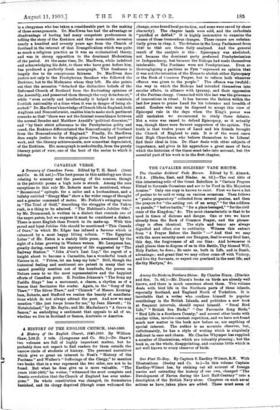A. HISTORY OF THE ENGLISH CHURCH, 1640-1660.
A History of the English Church, 1640-1660. By William Shaw, Litt P. 2 vols. (Longmans and Co. 36s.)—Dr. Shaw's two volumes are full of highly important matter, but he probably does not expect to find readers for them outside the narrow circle of students of history. The personal narratives which give so great an interest to Neal's "History of the Puritans" and Walker's " Sufferings of the Clergy," to mention two books that in a way represent the two sides, are not to be found. But what he does give us is more valuable. "The years 1640-1660," he writes, "witnessed the most complete and drastic revolution that the Church of England has ever under- gone." Its whole constitution was changed, its formularies banished, and its clergy deprived (though some welcomed the
change, some found local protection, and some were saved by sheer obscurity). The chapter lands were sold, and the cathedrals "purified or defiled." It is highly instructive to examine the causes of these tremendous changes. These causes are substan- tially given in chap. 1. The debates in the Long Parliament from 1640 to 1643 are there fully analysed. And the general result of the analysis is this : Episcopacy was abolished, not because the dominant party preferred Presbyterianism or Independency, but because the Bishops had made themselves intolerable. The Puritans were not Presbyterians. Even so thoroughgoing a partisan as Pym "expressed an opinion that it was not the intention of the House to abolish either Episcopacy or the Book of Common Prayer, but to reform both whereirer offence was given to the people." The offence was twofold : the way in which the Bishops had intruded themselves into secular affairs, in alliance with tyranny, and their oppression of the Puritan clergy. Connected with this last was the grievance of innovations in ritual It has become the fashion within the last few years to praise Laud for his tolerance and breadth of mind. Readers who may be disposed to accept thie view of Episcopal rule in the days when the King's power was still unshaken we recommend to study these debates. Not a voice was raised to defend Episcopacy, as it . actually was, though there were fervent supporters of the system. The truth is that twelve years of Laud and his friends brought the Church of England to rain. It is of the worst omen that High Churchmen who believe themselves to be Liberal find their ideal in him. Dr. Shaw deals with other subjects of importance, and gives in his appendices a great mass of facts which the historian of the times must take into account, but the essential part of his work is in the first chapter.


































 Previous page
Previous page